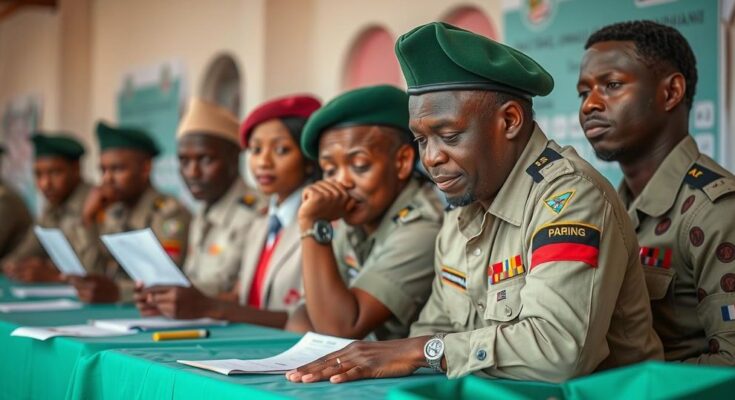Chad is holding legislative, provincial, and local elections after three years of military rule, amidst opposition boycotts alleging electoral fraud. The elections are seen as a key part of a political transition, yet accusations of electoral malpractice and heightened authoritarianism challenge their credibility.
Chad is conducting legislative, provincial, and local elections amid a backdrop of political tension following three years of military governance. These elections are being characterized by the government as the culmination of a political transition; however, opposition groups are boycotting them, alleging fraud in last year’s presidential election. The absence of opposition candidates allows individuals supporting Marshal Mahamat Idriss Itno, who ascended to power post-military coup, to dominate the electoral landscape.
Concerns regarding electoral integrity have intensified, with allegations from opposition spokesperson Succes Masra suggesting that pre-determined results are already secured within the electoral systems. Furthermore, the Democratic Party of the Chadian People alleged the disappearance of over a thousand ballots in Bongor, urging vigilance against purported fraud orchestrated by the ruling party. Voter turnout is expected to include about eight million registered voters, monitored by international observers amidst an environment fraught with challenges, including violent acts from militant factions and local unrest.
Opposition sentiments are bolstered by fears of increasing authoritarianism under the current regime, particularly recalling the violence faced by demonstrators in October 2022. Observers have noted a nearly complete media blackout during the electoral process, primarily attributed to a strike by journalists protesting government-imposed restrictions and a lack of financial support from the authorities. This scenario presents significant implications for Chad’s path toward democratic governance, as the legitimacy of the elections remains critically questioned by various stakeholders.
The recent electoral events in Chad occur in a context of prolonged military rule established after the death of long-time leader Idriss Deby Itno. His son, Marshal Mahamat Idriss Itno, took over leadership in 2021 amid military support, subsequently holding disputed presidential elections. This backdrop presents a complex landscape, where opposition parties allege systematic repression and electoral fraud, undermining the prospects of a transparent democratic transition. Furthermore, the political climate is exacerbated by ongoing security threats from extremist groups like Boko Haram and strained relations with former colonial powers. The legislative elections have been postponed multiple times due to various crises, including armed threats, financial issues, and health-related delays, reflecting on the difficulties in establishing a stable democratic framework in Chad. The political parties’ actions are pivotal in shaping not only the immediate electoral landscape but also the long-term governance trajectory.
In summary, Chad’s elections face substantial controversy, characterized by an opposition boycott and allegations of electoral malpractice. The current governance under Marshal Itno is challenged by claims of autocracy, with the recent electoral processes not only reflecting the struggle for democratic establishment but also highlighting the significant societal tensions. The political future of Chad remains uncertain as these elections unfold in a climate filled with doubt regarding their legitimacy and true representation of the electorate’s will.
Original Source: www.france24.com




